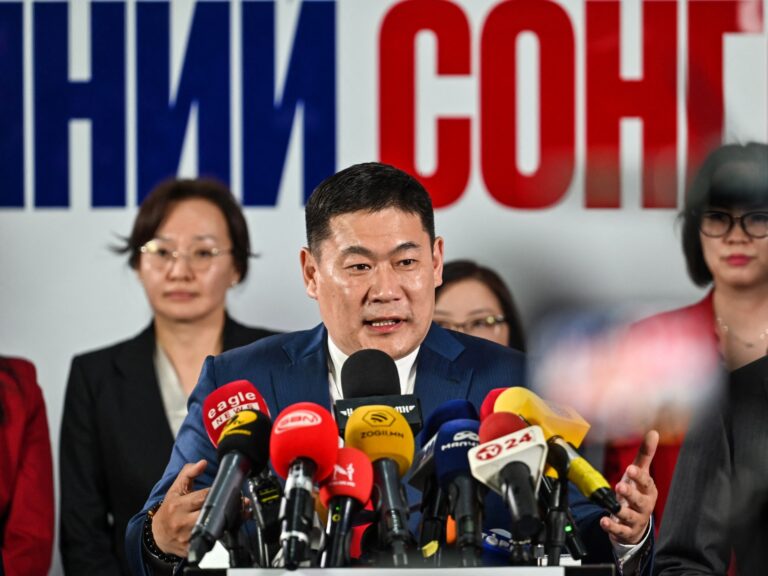Prime Minister Lubsanamsulain Oyun-Erdene has declared victory in the country’s parliamentary elections, but the opposition made major gains.
Preliminary results released early Saturday showed the ruling Mongolian People’s Party maintained a narrow majority in the country’s parliament, while the opposition Democratic Party made significant gains in seats.
Mongolian Prime Minister Luvsannamsurain Oyun-Erdene has declared an early victory in parliamentary elections amid deepening public anger over corruption and the state of the economy.
Speaking at a press conference in the capital, Ulaanbaatar, the prime minister said the ruling party had won a majority in the 126-seat parliament. “According to the results of the primary elections, the Mongolian People’s Party has [MPP] “There are 68 to 70 seats,” he said.
According to Mongolian media tallying, with 99% of the votes counted, the opposition Democratic Party won about 40 seats, a significant increase from 2020. The results suggest that the opposition was able to capitalize on voter discontent and erode the ruling party’s majority.
“Through this election, the people have shown their appreciation for the ruling party’s past policy mistakes,” said Democrat Party leader Gantumur Lubsannyam.
The MPP is the successor to the Communist Party, which ruled Mongolia with an iron fist for almost 70 years. It remains popular, especially among older voters in rural areas, and controls the country’s nationwide election campaign organisation.
Meanwhile, a tally by local media outlet Icon showed that the anti-corruption minority party HUN won eight seats. The votes will be counted by hand on Saturday to ensure accuracy, after which the official results will be announced.
“A new page in democracy”
On Friday, people in the vast country of 3.4 million people sandwiched between China and Russia voted to elect 126 members to the State Great Khural.
The streets of Ulaanbaatar, home to nearly half of Mongolia’s population, were plastered with colorful election posters promoting candidates across the political spectrum, from populist businessmen to nationalists, environmentalists and socialists.
Long lines stretched along the hallways of a polling station inside a school in central Ulaanbaatar, with many voters dressed in traditional costume.
Tsagaansorgy Duramsuren, a 36-year-old cashier who is pregnant with her fourth child, said the election gave her a chance to “power the candidates” she really wanted to support.
“I want lawmakers to do more to build infrastructure… and give more jobs to young people in manufacturing,” she said outside a hospital polling station on the outskirts of the capital.
Corruption scandals have undermined trust in the government and political parties, with the centre-right Democratic Party and the HUN Party emerging as a third party.
Key issues for voters included corruption, as well as unemployment and inflation in an economy reeling from the effects of first the COVID-19 pandemic and then the war in Ukraine.
But many young voters expressed disappointment with the ruling party and said they chose a younger candidate in the hope that he would bring about change.
“We are very disappointed with the results,” said Shijil Bachrun, 35, a marketing manager in Ulaanbaatar, suggesting that younger generations had stayed away from voting. “It’s the same result again. A singer, a wrestler and a businessman won.”
The prime minister also thanked those who did not vote for his party, saying that for the first time five or six parties have been elected to parliament, reflecting a “new page” in Mongolian democracy.
“Having diverse and contrasting opinions is the essence of democracy. Your criticism will be reflected in our actions,” he said.


